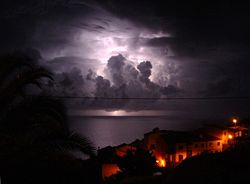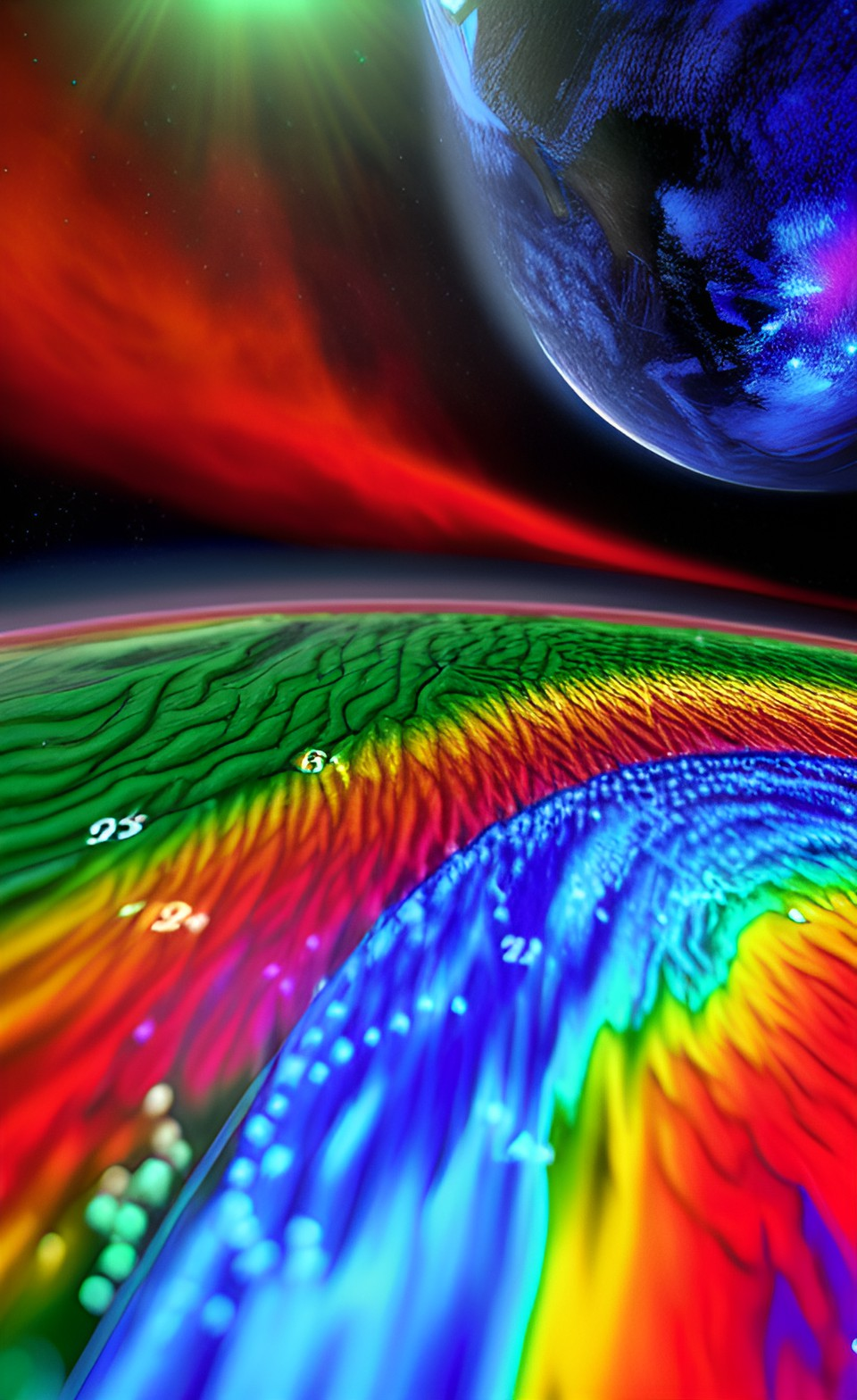- Air Homepage
- Weather Radar
- What Is Meteorology
Are you wondering What is meteorology?
Want to know what is meteorology? Meteorology is the study of the atmosphere and its processes, especially to forecast the weather. A meteorologist is a scientist who studies the atmosphere in order to make accurate forecasts of the weather.
Search for more possibilities.
Meteorology: Why It's Your Next Great Adventure 🚀Are you curious about what creates everything from a gentle breeze to a category five hurricane? Learn how cutting-edge physics and AI can turn you into a professional problem-solver who predicts the future and saves lives, instead of just watching the weather.
How Accurate? Forecasting the weather isn't random, it's science. Forecasting the weather is based on understanding the physics of the atmosphere and oceans and using sophisticated computer models to predict how they'll interact. Scientists can predict the weather with this knowledge.
Unleash Your Passion for the Skies: Why Meteorology is an Adventure You Should Pursue - Do you love the ever-changing weather patterns that shape our world? You're curious about the forces that govern our atmosphere, right? Then studying meteorology might be for you. Discover why meteorology is an adventure that awaits passionate and curious minds like yours as we explore the fascinating world of meteorology:
- Meteorology isn't just about forecasting the weather; it's about unraveling the mysteries of the skies. Imagine being able to understand the intricate processes behind thunderstorms, hurricanes, and Northern Lights. As a meteorologist, you'll connect dots and reveal hidden patterns that govern our atmosphere.
- Be at the forefront of climate science: Climate change is one of the biggest challenges of our time, and meteorologists play a key role in understanding it. You'll learn about climate science by studying meteorology, which explores how the atmosphere, oceans, and Earth's systems interact. Contribute to vital research, develop innovative solutions, and help shape the future of our planet.
- A degree in meteorology opens doors to lots of exciting careers. The field of meteorology offers a variety of paths to explore, whether you're into weather forecasting, climate modeling, research, or environmental consulting. It's possible to work for national meteorological agencies, research institutions, television stations, or even pursue advanced studies and become a respected expert.
- Meteorology is an art of problem-solving, where you'll have to analyze data, interpret models, and make critical decisions. Every day brings new puzzles, as you try to understand and predict the ever-changing weather patterns. The dynamic world of meteorology will sharpen your observational skills, mathematical acumen, and analytical thinking.
- Meteorologists play a key role in society by providing life-saving forecasts, early warnings of severe weather events, and disaster preparedness information. You can contribute to public safety, help communities adapt to climate change, and mitigate its adverse effects by studying meteorology. You'll make a real difference in people's lives with your work.
In meteorology, different atmospheric factors like temperature, pressure, humidity, and water vapor are studied.
Meteorology is different from all other branches of science because it predicts the future. Meteorology is much more than weather forecasting. In the past, it even predicted plagues, for instance.
Since time immemorial, weather has determined man's actions and inactions. A few months' worth of weather forecasts were needed for agriculture.
The history of this scientific study of meteorology
Aristotle made the first observations of atmosphere and weather in his work "The Meteorologica" around 340 BC.
Those ages were all about studying how the earth's atmosphere interacts with the moon, sun, and other planets. This method of weather prediction wasn't completely accepted by modern science.
The invention of increasingly sophisticated methods helped us gain a better understanding of atmospheric physics before computers came along. With this scientific approach, we were able to make numerical weather predictions. But it wasn't until computers became widespread in the 1950s that numerical weather predictions became easier.
Weather forecasts can now be made with satellites and constant monitoring of the atmosphere. With meteorological sensors, we can now measure temperature at many levels, at different locations, at different levels within the atmosphere, the movement of air in different directions, altitudes, etc.
In computer programs, thousands of calculations are made based on physics equations that relate independent properties of air, its behavior, and changes under different temperatures and pressures.
Future predictions: What is meteorology's next step?
More accurate atmospheric data and faster microprocessors will help forecasters make better weather reports. Meteorologists don't believe there's any way to make artificial rain.
Meteorologists also want to forecast the weather four weeks in advance. What's the future of meteorology? For meteorologists of the future, studying ancient earth's climate and studying climatic conditions in space will be important study materials.
We're all waiting to see whether mankind can create permanently favorable climatic conditions.
Ask ChatGPT: Forecasting and climate science with AI? Artificial Intelligence (AI) is revolutionizing meteorology, improving weather forecasting accuracy, and addressing climate science challenges.
AI can identify patterns and correlations from vast amounts of data using machine learning and deep learning algorithms. Meteorologists can track rapidly changing weather conditions and make informed decisions with real-time data analysis.
Climate models also rely on AI to help scientists understand long-term trends and predict the future. Using historical climate data and incorporating different factors, AI-powered models can simulate and project climate patterns, helping assess the impact of climate change and inform adaptation strategies.
Extreme weather event detection is another area where AI excels. AI algorithms can detect early warning signs of severe storms, floods, heatwaves, or droughts by analyzing large datasets.
Integrating AI with renewable energy systems is also important. AI optimizes energy generation and grid management by predicting solar and wind resource availability.
Exploring the world of meteorology is an exhilarating experience. Discover the skies, understand our planet's complex systems, and contribute to the pressing challenges of our time. As diverse as the weather itself, meteorology offers countless opportunities for growth, discovery, and making a difference. Embrace your passion for the skies, and let meteorology take you on an adventure. It's not the sky that limits you, it's where you start.
Collaboration between human expertise and AI holds great promise for weather intelligence. By using it, we can make informed decisions, protect lives, and build a sustainable future. As AI advances, its role in weather forecasting, climate science, and renewable energy integration will only increase, driving innovation and shaping our understanding of our dynamic atmosphere.
Go back from What is Meteorology to the
Radar Real Time Weather page.
Search this site for more information now.
Do you know what meteorology is and how it affects you?
Meteorology is the study of weather. In meteorology, things that come from the air are examined. In order to make weather predictions, different atmospheric variables are studied.
Do you have concerns about air pollution in your area??
Perhaps modelling air pollution will provide the answers to your question.
That is what I do on a full-time basis. Find out if it is necessary for your project.
Have your Say...
on the StuffintheAir facebook page
Other topics listed in these guides:
The Stuff-in-the-Air Site Map
And,
Thank you to my research and writing assistants, ChatGPT and WordTune, as well as Wombo and others for the images.
OpenAI's large-scale language generation model (and others provided by Google and Meta), helped generate this text. As soon as draft language is generated, the author reviews, edits, and revises it to their own liking and is responsible for the content.






New! Comments
Do you like what you see here? Please let us know in the box below.